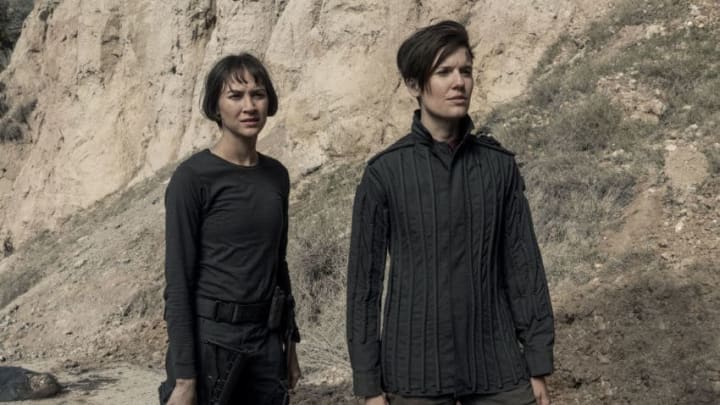LGBTQIA stories are so important in The Walking Dead’s narrative
Anytime discussions come up about representation in TV and films, especially in genre TV like The Walking Dead, there are people who grumble that it’s not unusual for people in fantasy or dystopian shows to be uncoupled so keeping an LGBTQIA character single, or not showing a romantic LGBTQIA relationship, isn’t a big deal. Our panel discussion continues with a look at why LGBTQIA couples matter in the TWD Universe.
And to some people that may be true. There are definitely lots of characters who don’t find love in the apocalypse world and end up alone. On both The Walking Dead and Fear The Walking Dead the survivor groups have typically been small and when there is just a small group of people it can be tough for anyone to find something that they are interested in who is also interested in them.
But when all of the core romantic relationships of the larger narrative are heterosexual that lack of representation needs to be looked at. Are those core relationships heterosexual because that is what fits the narrative or does it leave out the stories and experiences of marginalized groups?
Our panelists wanted to find out so they dug a little deeper into the depiction of LGBTQIA couples in The Walking Dead universe.
Part 4 – LGBTQIA Romances On Screen
Do you believe it’s important for LGBTQIA+ couples to be included in the show’s narrative?
Sonya says:
"It absolutely is. And seeing LGBTQIA couples is different from seeing straight couples because of the way that LGBQIA romances have been left out of the cultural narrative. TV shapes how we see the world and how we see each other. Showing loving and romantic relationships that aren’t heterosexual is important because it helps to shift the cultural perception of what love is, and what it can be. In The Walking Dead universe where people are fighting for love and for humanity reframing the picture of what love looks like and normalizing all kinds of relationships, not just CIS heterosexual ones, is critically important.I thought that the Fear TWD episode “The End Of Everything” was absolutely wonderful because it was an archetypal love story that could have taken place between any two characters and they choose to give that story to LGBTQIA characters. Huge kudos to Fear TWD for that. I love that TWD did show that with Magna and Yumiko in season 10 also and I hope we will see continued growth as the universe expands."
Joe says:
"It is incredibly important for LGBTQ+ couples to be included in The Walking Dead’s narrative. Representation is such a vital component in any piece of media, especially when they have as large an audience as The Walking Dead. For people growing up, it is incredibly inspiring and helpful to be able to identify with characters like yourself, as it shows people that they can be who they are without shame or fear.Providing opportunities for people who identify as LGTBTQ+ to see themselves on screen can only be a good thing for The Walking Dead universe. Telling people stories of people from all different backgrounds, races, genders, sexualities, and more is a vital way for us to work towards true equality. As a show with a massive following, The Walking Dead has a responsibility to show people that they should feel free to be who they truly want to be."
Sara says:
"Yes! It is absolutely important and vital to show LGBTQIA+ couples on screen. I’ve never been a person to “ship” characters or get very caught up in relationships. I’d rather have characters be valued for who they are versus losing themselves for another person. I think all relationships need to come from a natural place.As long as that happens we need to see everything, straight or gay, and everything in between. Couples fighting, couples getting along, love scenes, and breakups. It’s all a part of life and LGBTQIA+ characters need to be normalized, so children can grow up feeling normal and loving themselves for who they are. Seeing “yourself” on screen is a HUGE deal, growing up feeling wrong about yourself can lead to self-hate."
Dawn says:
"Abso-frick’-lutely. The shows tells real human stories, in an unreal world. And real humans are LGBTQ, and every one on that spectrum absolutely deserves to have their story told on screen. LGBTQ relationships (and those LGBTQ people outwith relationships) have the same right to be seen on screen as every other aspect of humanity.It’s also hugely important to “normalise” LGBTQ lives and for the audience to see these characters in shows which are not directly about sexuality and relationships, but for whom it’s simply an aspect of their character like their accent. This is especially true in a show genre which can be known to have a traditionally conservative viewership. When the audience feels they know the characters in their favorite show, and those characters represent an aspect of life they may not have been familiar with in their own life, that helps bring those lives to life."
What do you think TWDFamily? Tweet with us and join the conversation: @SonyaIryna, @Labross_Joe, @MamaDeadHead, @DawnGlen2 and @UndeadWalkingFS
